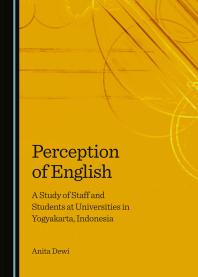(Ebook) Perception of English : A Study of Staff and Students at Universities in Yogyakarta, Indonesia by Anita Dewi ISBN 9781443873949, 1443873942
There has been a significant increase in the number of English speakers globally, with the majority of them being non-native speakers who rely on diverse varieties of the language. Throughout its history, English has been disseminated through a number of processes, ranging from colonialism to globalisation. This has ultimately resulted in the formation of various relationships between English and target communities. English has also spread to countries where Muslims constitute the majority of the population. As religious teachings are embedded in local or national cultures, and thus result in non-homogeneous Islamic communities across the globe, it is a frequently used oversimplification to conclude that English consistently stands in opposition to Islam in every Islamic society. Given such misperceptions, studies directed towards perceptions of English in Indonesia, the fourth most populated country and the largest Muslim community in the world, are particularly important. This book examines a variety of perceptions of English in this context, focusing on staff and students at universities in Yogyakarta, Indonesia. Five research questions were used as the basis for conducting this study, which analyse the themes of English and its acceptance in Indonesia; English at the tertiary level; the roles of English; English in relation to identity; and the perception of World Englishes. Employing a mixed-methods approach, the study was carried out at nine public and private universities with differing religious viewpoints – namely, secular, Catholic, and Islamic. There are five different groups of participants for individual interviews and questionnaire surveys: students, English language lecturers, non-English lecturers, and leaders at each of the nine universities. The results reveal that English is viewed as a tool and asset for advancing knowledge, facilitating international communication, gaining global competitiveness, and improving employment opportunities. However, perceived tensions between English and Indonesian constantly occur throughout all facets of the study. Even though Indonesian people’s “repository of cultural identity” (Tan and Rubdy, 2008, p. 5) is located within local languages rather than in Indonesian as the national language, the Indonesian language actually unites them as one people and differentiates them from people of other nations. This suggests a demand for a “contemporary global linguistic ecology” (Phillipson and Skutnabb-Kangas, 1999, p. 20). In such ecology, English would keep developing in a way that does not impact negatively on the national language. Indeed, such demand for a balance between English and Indonesian is politically desirable.
*Free conversion of into popular formats such as PDF, DOCX, DOC, AZW, EPUB, and MOBI after payment.


